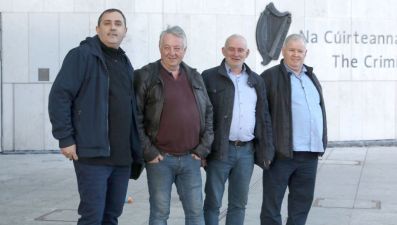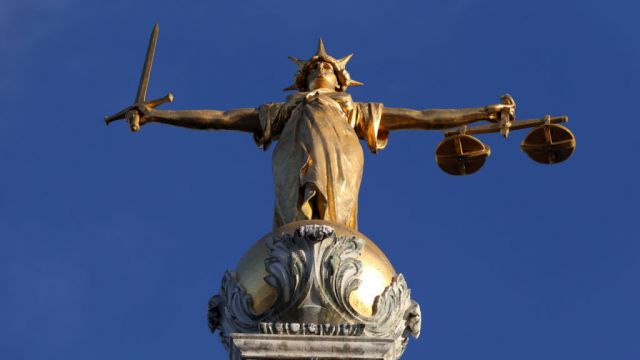Defence counsel for one of three men accused of raping a woman in a carpark six years ago has claimed it is “improbable” that the woman would not have noticed another car arrive in the area.
On the sixth day of the Central Criminal Court trial, the complainant was cross-examined via videolink on her evidence by defence counsel for the third defendant.
The first defendant (22) has pleaded not guilty to rape and sexual assault.
A second defendant (23) has pleaded not guilty to rape, oral rape and two counts of sexual assault. The third defendant (22) has pleaded not guilty to rape and oral rape.
The offences are alleged to have occurred on December 20th, 2017 at a hotel car park in the Leinster area. The complainant was aged 17 at the time.
Mark Nicholas SC, representing the third complainant, told the woman that his client instructs that the sexual activity between them was consensual, that she was “fully involved and participating” and she didn't say no.
The woman disagreed with this statement. She replied that she had said no and didn't participate.
Mr Nicholas noted that the complainant's friend used her phone to call the boys 11 times over a two-hour period while the two women waited for the car to arrive.
The woman accepted she gave her phone to her friend to use. The complainant said she knew her friend was making calls, but didn't notice how many as they were chatting.
She said she thought there was a discussion about sex between her friend and the boys during the first call, and her friend had said no.
Mr Nicholas asked the complainant why she stayed at that location for over two hours. She said she was hanging out with her friend.
Excuse
Defence counsel asked the woman why she didn't make an excuse to leave if she didn't want to go for a drive. The woman said she didn't think of that, and she does not tell lies.
Mr Nicholas suggested to the woman that her friend was “going for an adventure” and encouraged her to go.
“It was only supposed to be for a drive,” the complainant said, adding that she thought they were going with her friend's cousin.
Mr Nicholas suggested to the complainant that she would have known from chatting with her friend what was likely to occur when they went for a drive.
“I guess you can call me slow because I hadn't copped that they were going to do what they did to me,” she said.
Mr Nicholas suggested that her friend wanted the boys to arrive quicker and that “the plan was you'd both go off with them.”
The complainant said she didn't want to go for a drive and told counsel that she couldn't speak for her friend.
Mr Nicholas put it to the woman that her earlier evidence that there had been an argument during the drive to the carpark was a “contortion”.
He suggested an “open discussion” occurred between the males sitting in the front of the car and her friend about sex.
The woman said there was a row between the occupants at the front of the car, and she was scared. She said she can not remember what her friend said.
When asked why she did not try to contact anyone during the journey, the woman said she could not remember, but was scared she would get in trouble.
Referring to her evidence that she was sitting in the back seat when the third defendant asked her for oral sex, Mr Nicholas noted that the woman told gardaí that this occurred when she was sitting in the front of the car.
The woman said she remembered sitting in the back seat when this occurred. She said she may have been “getting confused” when she gave a statement to gardaí.
Arrival of car
Mr Nicholas said a security guard is expected to give evidence during the trial of what he saw when he arrived in the car park.
Counsel said the guard is expected to say he saw a male and female having sex in a car and spoke to another male who was sitting in the front of the car. The woman said she did not see anyone.
Mr Nicholas suggested it was “improbable” that the woman would not have seen a car arrive with its lights on.
“I didn’t see anyone else but the people who were raping me,” she said.
Mr Nicholas put it to the woman that this was someone who could have helped her. “If I saw him, I’d have shouted out,” she said.
CCTV from another car park where the car stopped was shown to the jury.
Mr Nicholas suggested there were “plenty of people” and the woman “could have got out and ran for help” if she wished. The woman accepted this and said she didn't think to do so as she was afraid.
He asked why she didn't go to the hotel for help. The woman said she was afraid and “didn't think of it at that moment”. She said she “didn't realise she had seen people”.
Mr Nicholas suggested to the woman that she wasn't in danger and didn't look for help as “nothing had happened” and she disagreed with this.
He also asked her why she didn't run for help when she got out of the car when it was stopped at a garage.
“You could have got out of the car and ran for help, but you got back into the car,” he said and the woman accepted this. She said she remembered getting cigarettes and cans of Red Bull on the way back from the carpark.
Mr Nicholas put it to the woman that she told gardaí she passed her lighter “round with people who attacked you.” He put it to her that this seemed “inconsistent”.
Mr Nicholas noted that the boys said “they'd see her tomorrow” when they dropped her home.
“They had no indication you were upset,” Mr Nicholas said.
The woman said she was in “fight or flight” mode, Mr Nicholas noted that she didn't do either of those things on that night.
“I was stuck,” the woman said.
Mr Nicholas asked the woman why she didn't send a message asking for help. Instead, she asked a friend to keep an eye on her location. She said she was afraid and couldn't remember when she sent this message.

The complainant accepted that she got her sibling's phone and sent a message to a friend she had told about the events of that night. She agreed with defence counsel that she did this to give the impression that she had told her sibling what happened.
Mr Nicholas put it to the woman that she had “deceived” this friend, and the complainant said she “didn’t want to make a big deal about what happened at the time”. She said she told her friend the truth a few days later.
The woman said she told her mother about what happened two days later on December 22nd, 2017. Her mother then contacted the Rape Crisis Centre and made an appointment on behalf of the complainant at a sexual assault treatment unit for the next day.
The trial continues before Ms Justice Melanie Greally and the jury.







